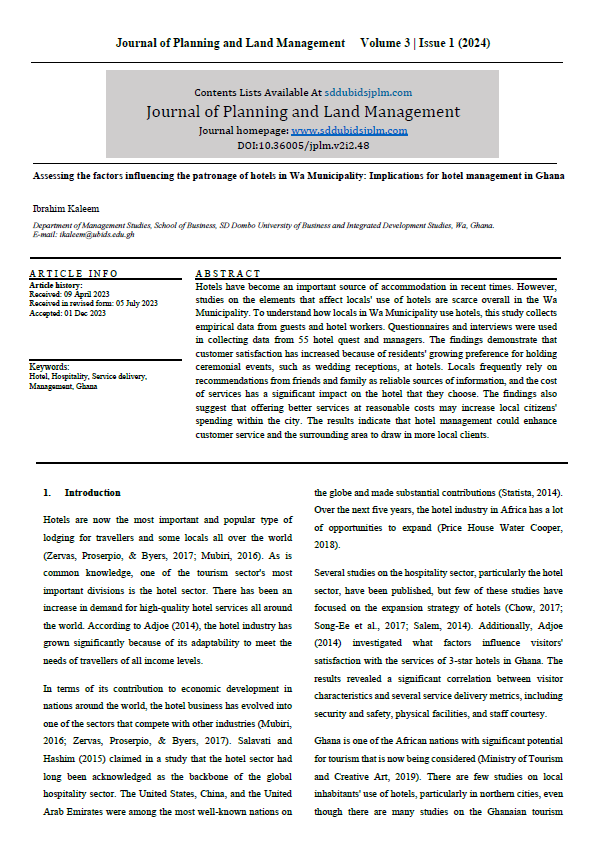Assessing the factors influencing the patronage of hotels in Wa Municipality: Implications for hotel management in Ghana
Keywords:
Hotel, Hospitality, Service Delivery, Management, GhanaAbstract
Hotels have become an important source of accommodation in recent times. However, studies on the elements that affect locals' use of hotels are scarce overall in the Wa Municipality. To understand how locals in Wa Municipality use hotels, this study collects empirical data from guests and hotel workers. Questionnaires and interviews were used in collecting data from 55 hotel quest and managers. The findings demonstrate that customer satisfaction has increased because of residents' growing preference for holding ceremonial events, such as wedding receptions, at hotels. Locals frequently rely on recommendations from friends and family as reliable sources of information, and the cost of services has a significant impact on the hotel that they choose. The findings also suggest that offering better services at reasonable costs may increase local citizens' spending within the city. The results indicate that hotel management could enhance customer service and the surrounding area to draw in more local clients.
Downloads
References
Adjoe, E. (2014). Determinants of Tourists’ Satisfaction with Hotel Service Delivery: A Study of a Three Star Hotel in Kumasi-Ghana, Master’s Thesis, Nkrumah University of Science and Technology, Kumasi, Ghana.
Barney, J., Wright M. and Ketchen Jr. D.J., (2001). The resource-based view of the firm: ten years after 1991. Journal of Management, 27(6), 643-650.
Burns, P. (2001). Entrepreneurship and Small Business. Palgrave Macmillan, Basingstoke.
Caribbean Tourism Organization (2002). Hotel Classification System: Summary of articles and Information on Hotel Classification System. Research department of the Caribbean tourism organization 2002.
Creswell, J.W. (2003). Research design: Qualitative, quantitative, and mixed methods approaches (2nd Ed.). Thousand Oaks, CA: Sage Publications.
Drazin, R. and Rao H., (2002). Harnessing managerial knowledge to implement product-line extensions: how do mutual fund families allocate portfolio managers to old and new funds? Academy of Management Journal. 45(3), 487-490.
Frempong, F., & Deichmann, J. (2015). Ghanaian hospitality professionals’ perceptions of international tourism impacts. Geo-journal. 4(3), 1-19.
Ghana Tourism Authority (2012). Tourism Statistical Fact Sheet on Ghana. Ghana Tourist Board, Research Department, Accra.
Johnson, Gerry and Scholes, Kevan, (2002). Exploring corporate strategy. Text and cases. (6th edition), Prentice Hall/Financial Times, Essex, England.
Kellermanns, Franz W. and Eddleston, Kimberly A., (2004). “Feuding families: when conflict does a family firm good”, Entrepreneurship: Theory & Practice, 28:3, Spring.
Kim, D.H. (1990). Toward Learning Organizations: Integrating Total Quality Control and Systems Thinking. Working Paper n.07.003, Cambridge: MIT.
Kim, S., Kim, J., & Park, S. (2017). The Effects of Perceived Value, Website Trust and Hotel Trust on Online Hotel Booking Intention. Sustainability, 9(12), 2262.
Martin, D., and Isozaki, M. (2013). Hotel marketing strategies in turbulent times: Path analysis of strategic decisions. Journal of Business Research, 66, 1544–1549.
Medlik, S. and Ingram, H. (2000). The business of hotels. Great Britain: Elsevier Butterworth-Heinemann.
Ministry of Tourism, culture and Creative Arts (2012). National Tourism Development Plan 2012 – 2027. Ministry of Tourism, culture and Creative Arts, Ghana.
Narteh, B., Agbemabiese, G. C., Kodua, P., & Braimah, M. (2013). Relationship marketing and customer loyalty: Evidence from the Ghanaian luxury hotel industry. Journal of Hospitality Marketing & Management, 22 (4), 407-436.
Ogbonna, E. and Harris, L.C., (2001), “The founder’s legacy: hangover or inheritance?” British Journal of Management, 2, 12:1.
Salavati, S. and Hashim, N.H., (2015). Website adoption and performance by Iranian hotels. Tourism Management. 46, 367-374
Salem, I.E. (2014). Toward better understanding of knowledge management: Correlation to hotel performance & innovation in five-star chain hotels in Egypt. Tourism & Hospitality Research, 14(4), 176-196.
Santos M, Brochado A and Esperança J., (2016). Foreign direct investment patterns of global hotel chains. Journal of Business Research, 69, 5235–5240.
Saunders, M., P. Lewis, et al. (2003). Research Methods for Business Students. London, FT Prentice Hall.
Teng, Y.-M., Wu, K.-S., & Chou, C.-Y. (2020). Price or Convenience: What Is More Important for Online and Offline Bookings? A Study of a Five-Star Resort Hotel in Taiwan. Sustainability, 12(10), 3972.
Ustrov, Y., Valverde, M. and Ryan, G. (2016). Insights into emotional contagion and its effects at the hotel front desk. International Journal of Contemporary Hospitality Management, 28(10), 2285-2309.
Virginia Phelan, K., Christodoulidou, N., Countryman, C.C. and Kistner, L.J. (2011).To book or not to book: the role of hotel web site heuristics. Journal of Services Marketing, 25(2), 134-148.
Zervas G., Proserpio, D., and Byers, J.W., (2017). The rise of the sharing economy: Estimating the impact of Airbnb on the hotel industry. Journal of Marketing Research, 54(5), 687-705.

Downloads
Published
How to Cite
Issue
Section
License
Copyright (c) 2023 Journal of Planning and Land Management

This work is licensed under a Creative Commons Attribution-NonCommercial 4.0 International License.




